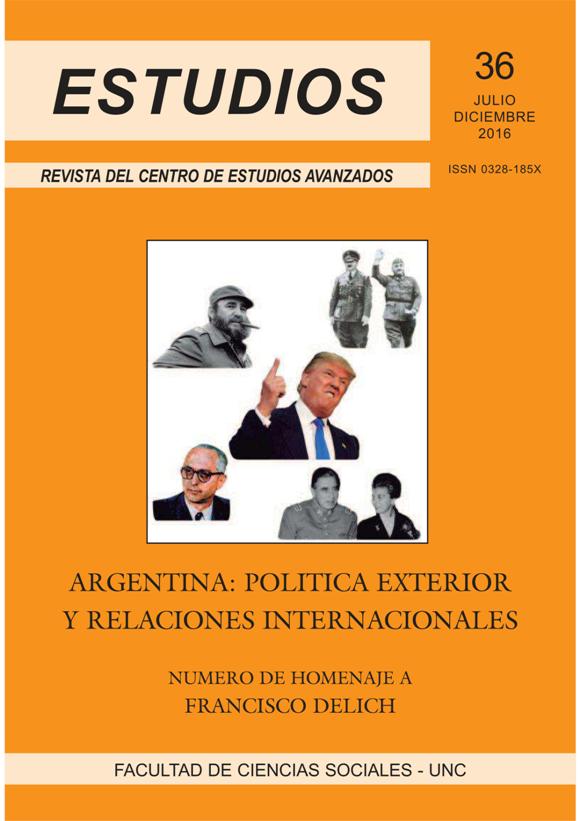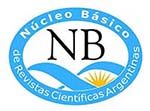Autonomous Foreign Policy and the Argentine Boycott of the U.S. forfeiture on Cuba
DOI:
https://doi.org/10.31050/re.v0i36.17160Keywords:
Argentina´s foreign policy, Autonomy, Boycott to the Cuban forfeiture, Commercial relationships, United StatesAbstract
This project addresses the political ideas and events that, in the '70s in Argentina, gave rise to what Juan Carlos Puig called “heterodox autonomy”, a strategic position in the politics of foreign relations. Different actions took place in this period, from the open confrontation with the United States, regarding positions in international organisms, to the continuation of commercial agreements with this country, and the rapprochement with countries of the East and of the third world. In this context, it developed what would be referred to as the Argentinean boycott to the Cuban embargo, which, analyzed as a paradigmatic occurrence of heterodox autonomy, entailed a commercial strategy that, benefiting local, national and transnational companies, allowed its fruition.
Downloads
References
AGEE, Paul, (1987),La CIA por dentro. Diario de un espía. Buenos Aires: Sudamericana.
BODES, José y LÓPEZ, José, (2003),Perón-Fidel. Línea directa. Cuando la Argentina rompió el bloqueo a Cuba. Buenos Aires:Memoria del Dragón.
BOERSNER, Demetrio, (1982),Relaciones Internacionales de América Latina. Caracas: Nueva Imagen.
BOLOGNA, Bruno, (2010), “La autonomía heterodoxa de la Política Exterior de Néstor Kirchner”, en: BOLOGNA, Briceño y otros,La Política exterior del Cristina Fernández. Edición preparada por el CERIR. Tomo V. Rosario. UNR Editora.
DE IMAZ, José Luis, (1974) “¿Adiós a la teoría de la dependencia? Una perspectiva desde la Argentina”Revista Estudios Internacionales. N° 28. Vol.7. Chile. Universidad de Chile. pp. 49-75.
DOS SANTOS, Theotonio, (1968), “La cambiante estructura de las inversiones extranjeras en América Latina” en: Petras, James y Zeitlin Maurice. comp. América Latina: ¿Reforma o Revolución?Buenos Aires: Tiempo Contemporáneo.
ESCUDÉ, Carlos, (2000), “Los gobiernos peronistas (1973-1976)” en Cisneros, Andrés y Escudé CarlosHistoria general de las relaciones exteriores de la República Argentina. Tomo XIV Buenos Aires. Publicación del Centro de Estudios de Política Exterior y el CARI.
KRASNER, Stephen, (1989),Conflicto Estructural. El tercer mundo contra el liberalismo global. Buenos Aires:GEL.
MONETA, Juan Carlos, (1988), “La política exterior del peronismo: 1973-1976” en: Russell,Roberto y Perina, Raúl. Argentina en el mundo (1973-1987), programa RIAL. Buenos Aires: GEL.
MORRAY, Joseph Parker, (1968), “Estados Unidos y América Latina” en: Petras, James y Zeitlin Maurice comp. América Latina: ¿Reforma o Revolución?Buenos Aires: Tiempo Contemporáneo.
PÉREZ LLANA, Carlos, (1973), “Perú en el sistema mundial y regional” en: PUIG, MONETA, PEREZ LLANA y CARELLADe la dependencia a la liberación. Política exterior de América Latina.Buenos Aires: La Bastilla.
PUIG, Juan Carlos, (1973), “El caso de la International Petroleum CO.” en: PUIG, MONETA, PEREZ LLANA y CARELLA, De la dependencia a la liberación. Política exterior de América Latina.Buenos Aires: La Bastilla.
PUIG, Juan Carlos,(1984), “La política exterior argentina: incongruencia epidérmica y coherencia estructural”, en: PUIG, Juan Carlos (Comp.),América Latina: Políticas exteriores comparadas. Tomo 1. Buenos Aires: GEL.
PUIG, Juan Carlos, (1986), “Integración y Autonomía de América Latina en las postrimerías del siglo XX”.Revista Integración Latinoamericana. Cátedra INTAL. N° 109 enero-febrero. Buenos Aires. pp 40-62.
WALLERSTEIN, Immanuel, (1996),Después del Liberalismo. México:Siglo XXI.
Downloads
Additional Files
Published
How to Cite
Issue
Section
License
Aquellos autores/as que publiquen en esta revista, aceptan los términos siguientes:- Los autores/as conservarán sus derechos de autor y garantizarán a la revista el derecho de primera publicación de su obra, el cual estará simultáneamente sujeto a la Licencia Creative Commons Atribución-NoComercial 4.0 Internacional que permite a terceros compartir la obra siempre que se indique su autor y su primera publicación esta revista.
- Los autores/as podrán adoptar otros acuerdos de licencia no exclusiva de distribución de la versión de la obra publicada (p. ej.: depositarla en un archivo telemático institucional o publicarla en un volumen monográfico) siempre que se indique la publicación inicial en esta revista.
- Se permite y recomienda a los autores/as difundir su obra a través de Internet (p. ej.: en archivos telemáticos institucionales o en su página web) luego del proceso de envío, lo cual puede producir intercambios interesantes y aumentar las citas de la obra publicada. (Véase El efecto del acceso abierto).











